By ERICA MacKNIGHT With the 20-year anniversary of the Sept. 11, 2001, terrorist attacks approaching, Brooke Lawrence, executive officer of the Rhode Island Disaster Medical Assistance Team, or DMAT, recalls his experience of being deployed to help
This item is available in full to subscribers.
We have recently launched a new and improved website. To continue reading, you will need to either log into your subscriber account, or purchase a new subscription.
If you are a current print subscriber, you can set up a free website account by clicking here.
Otherwise, click here to view your options for subscribing.
Please log in to continue |
|
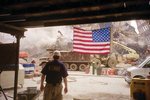
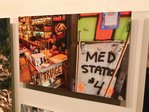
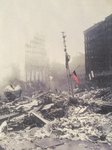
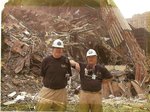
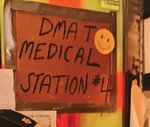
With the 20-year anniversary of the Sept. 11, 2001, terrorist attacks approaching, Brooke Lawrence, executive officer of the Rhode Island Disaster Medical Assistance Team, or DMAT, recalls his experience of being deployed to help frontline workers the day the Twin Towers collapsed.
The team was sent to give medical support to the people tasked with cleaning up what became known as “the pile.”
Lawrence was working in Springfield, Massachusetts, on the day of the attacks, and at first thought a small plane had hit the first tower.
“Everyone thought it was an accident, maybe a small Cessna plane flying too low. Then the second plane hit the other tower, and we knew it was much more serious,” he said. “I managed to miss watching any of the events live. I came back to Rhode Island, and we left for New York at about 5 p.m. that night. When we arrived in the city, there were people on the sidewalk, eight to 10 people deep, waving American flags, cheering and clapping. New Yorkers aren’t known as the most friendly bunch, but here they were, coming together as Americans.”
He added: “That night when we arrived for our first shift, there was still smoke coming from the rubble. It was surreal. One thing that has always stuck with me was the amount of office paper everywhere. It was in the trees, the alleys, everywhere. It struck me that just a day before, someone in an office somewhere had been worrying about all this paper, and now it was completely meaningless. I try to apply that in my own life, a lot of this stuff we worry about isn’t as important as we think it is.”
According to Lawrence, “We set up field hospitals strategically around the pile, because at that point what we had was probably the world’s largest construction site. Every piece of material needed to be moved. We quickly recognized that it’s going to take five or six stations around the rubble pile, in order to be able to give the level of service that was needed.”
Based out of a bodega, Lawrence’s team was able to provide frontline workers with anything they needed. Whether it was medical care for a laceration, or something as simple as a toothbrush, the team was ready with supplies, equipment and care.
Staying at a hotel, the team was at the site for 16 days, working eight-hour shifts around the clock. Volunteers from all over New England were based out of Fort Stewart Air Force base in upstate New York. By Sept. 12, a group of more than 70 personnel had arrived to support the clean up effort.
“I remember the one thing I was adamant about was making sure the floor in our Med station was spotless at all times. Outside, there was chaos, and there was very little we could control, but I made sure that I could control that one thing, a clean floor,” he said.
During his time working on the response, Lawrence avoided the missing persons’ posters, memorials for firefighters, and compartmentalized any emotions he had regarding such a large loss of life.
Ten years later, he went to the 9/11 Museum & Memorial and finally saw all those posters. There was a picture of Med Station Four, where DMAT was stationed, and even a hand-drawn sign Lawrence had created all those years ago. It was a full circle moment.
“I was finally able to fully appreciate what we had been a part of, and I was emotionally ready to see the memorial,” he said. “I am in contact with many of the people we met while stationed there.”
Since this year is the 20th anniversary of the 9/11 tragedy, Lawrence will be presenting his experiences at a local event.
“I will be presenting at a memorial at the West Greenwich Pavilion on this year’s 9/11,” he said.
Lawrence started his career at the age of 14, becoming a volunteer firefighter right down the road from the DMAT offices in East Greenwich. He then became an EMS officer, and later went into medical sales.
For the past year and a half, he and the rest of the DMAT personnel have been working on the state’s COVID-19 response. It’s an effort that’s extended far beyond what anyone involved imagined in the earliest days of the pandemic.
“Nobody thought that it would be this long, but here we are today,” he said.
Lawrence said responding to disasters like 9/11, hurricanes and power outages has prepared the team to face one of the biggest challenges of their careers. Although talk of a potential pandemic had been going on for years, the team sensed early on that this crisis would be something they hadn’t faced before.
“March 12, 2020 … we learned from the Department of Health that we were going to lean forward with this COVID thing,” he said. “We started having that conversation – what is going to be the need? Then we started talking about PPE [personal protective equipment], and with my background in medical sales, I started reaching out to some of my contacts, to try to secure PPE, which at the time was a hard thing to get your hands on. I said on day one, this is not going to go by the playbook.”
Rhode Island’s pandemic response has been a highly coordinated effort. DMAT had to improvise, adapt and overcome the obstacles before them. Initially, five or six testing sites were set up, which morphed into vaccination sites over time. There are a lot of moving parts involved in setting up such large-scale operations, and the information technology team working with DMAT was a huge piece of the puzzle. Lawrence calls them the unsung heroes of the response.
“One of the things I’m most proud of during the COVID response is a couple IT guys have really gone above and beyond,” he said. “They have done an amazing job building a vaccination clinic management tool and access database. It allows us to completely streamline our operations. It’s incredible.”
Setting up such large-scale vaccination clinics requires a lot of logistics, from acquiring the drug to recruiting volunteers.
“For us, every game we have is an away game. We are always on the road, and we have to bring all that equipment with us. We have to be organized, and we have to keep the logistics together,” Lawrence said.
Going forward, Lawrence thinks much work remains in the pandemic response.
“It’s likely that we are looking at that third dose for most people, and we need to get the younger kids vaccinated,” he said. “From a planning perspective with our operations, I’m looking towards the end of the first quarter 2022. Although, we could still be sitting here next June. We just don’t know. So what we do is make data driven, scientific decisions.”
The Rhode Island Disaster Medical Assistance Team is always looking for new volunteers, and can be reached at (401) 385-3911, ext. 102, or blawrence@ridmat.org.
Comments
No comments on this item Please log in to comment by clicking here